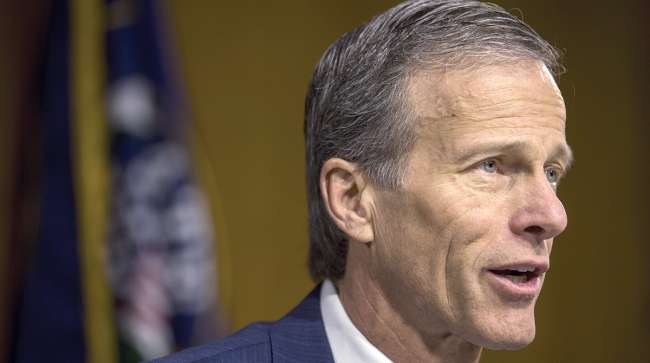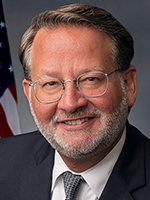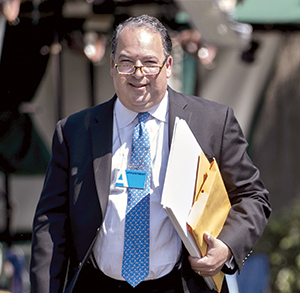Senior Reporter
Opportunity Exists for Advancing Autonomous Vehicles Bill This Congress, Sen. John Thune Says

Legislation aimed at popularizing the use of autonomous vehicles in commercial and commuter settings is gaining supporters in the Senate, signaling its consideration possibly as early as this spring.
Senate Majority Whip John Thune (R-S.D.) indicated that his colleagues have expressed interest in restarting discussions on a measure that would outline the requisite provisions for infrastructure, as well as safety associated with autonomous cars and trucks.
Thune emphasized he is hopeful the legislation could be introduced in the near future, noting the opportunity for bipartisanship with Democrats who control the House. An autonomous vehicles bill in the previous Congress co-sponsored by Thune, who at the time chaired the Commerce Committee, failed to land on President Donald Trump’s desk. Several Democrats had pushed back on the bill.
“I hope we can close the deal because we really do need to have this sort of framework in place that puts the safety guardrails around the technology,” Thune said Feb. 13 at an event hosted by Axios in Washington. “But the technology is moving, and it’s important for Congress and federal policymakers to keep up with it.”

Peters
Co-sponsoring the bill with Thune last year was Michigan’s Gary Peters (D), who has insisted on revisiting the bill’s consideration in committee. The bill’s objective, as Peters has explained, would be to establish a policy framework for the autonomous vehicles industry.
Supporters of a nationwide federal framework say they intend to resolve policy differences with opponents on Capitol Hill before reintroducing the legislation. In the previous congressional session, the bill’s floor consideration was blocked due to concerns stemming from broadband accessibility, privacy and safety. Democrats, including Sens. Richard Blumenthal of Connecticut, Dianne Feinstein of California and Edward Markey of Massachusetts, raised the concerns.
A top Senate aide with insight into current negotiations recently told Transport Topics a bipartisan group of lawmakers is in agreement over the need for considering an autonomous vehicles bill in the 116th Congress. “We just want to make sure there is proper regulation,” the aide added.
Separately, House transportation authorizers are expected to debate autonomous policies in the coming months. Last year, the House advanced its autonomous vehicles legislation that pertained to cars, and not trucks.
Regulators have monitored the industry’s progress on autonomous technology. In the fall, the U.S. Department of Transportation unveiled an update of guidelines that emphasized safety, technology neutrality, consistent regulations and a proactive preparation for automation.
Meanwhile, stakeholders, such as the U.S. Chamber of Commerce, Amazon.com, Waymo, Uber and automakers continue to call on Congress to jump-start its autonomous vehicle debate.

Bainwol (Andrew Harrer/Bloomberg News)
The Alliance of Automobile Manufacturers recently wrote to congressional leaders urging them to craft federal guidelines on the testing and deployment of autonomous vehicles.
“Many of the rules that currently govern the operation of a motor vehicle were created at a time when a self-driving vehicle was a science-fiction fantasy, rather than a technological breakthrough on our doorstep. Updating these regulations in an expeditious manner is a common-sense step to increase overall roadway safety,” Alliance of Automobile Manufacturers President Mitch Bainwol wrote Feb. 14. “Accepting the status quo only slows down the real and consequential progress that can be made in [autonomous vehicles] technology that will help reduce the accidents attributable to human choice or error.”
Auto Alliance AV Legislatio... by on Scribd
American Trucking Associations continues to advocate for the inclusion of commercial vehicles in autonomous-centric legislation. ATA has emphasized the potential benefits to highway safety and freight connectivity associated with the technology.
Firms in Rhode Island, Nevada, Colorado, Georgia and Michigan are testing the technology along designated areas. Proponents say the technology may be marketplace-ready in about a decade.

